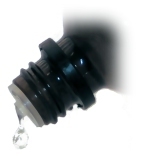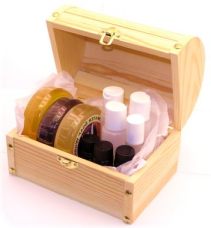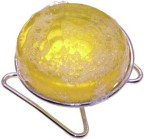 We receive many inquiries about exotic oils, such as Fig, Lily of the Valley, Lychee and Strawberry essential oil for instance. Most of the time, however, these oils do not exist as an essential oil, and are available only as a fragrance oil. What's the difference between essential and fragrance oils, you ask? Well, frankly, there is no comparison.
We receive many inquiries about exotic oils, such as Fig, Lily of the Valley, Lychee and Strawberry essential oil for instance. Most of the time, however, these oils do not exist as an essential oil, and are available only as a fragrance oil. What's the difference between essential and fragrance oils, you ask? Well, frankly, there is no comparison.
Essential oils are 100% pure, natural extracts from fruits, herbs, plants, trees, seeds, flowers, and roots. Essential oils are extracted using steam distillation or Carbon dioxide, or pressed by expeller press (Citrus fruits). Essential oils that are extracted by food grade solvent are called concretes and absolutes. Oils should only be called essential oils when they are completely as nature made them and come from a source in nature. Essential oils are extremely complex, and the components that give an essential oil its scent are only part of the oil. The sum total of its components give essential oils life and energy and incredible powers to heal, balance, uplift, calm, invigorate etc. They have an effect that is completely organic and in-tune with our bodies, supported by years of evolution and exposure to the plants and trees that the oils come from.
Fragrance oil, in contrast, are composed mainly or completely of manufactured, synthesized ingredients. Fragrance oils may be made up in part with an essential oil, but more often than not (especially if the essential oil is expensive), they are completely synthetic. The problems with fragrance oils (this includes perfumes) are many. Fragrance oils contain hundreds of synthetic chemicals, none of which are regulated by government agencies and they contain toxins that will damage every organ in your body, including your brain. Toxic chemicals in fragrance oils such as fixatives (which makes the scent last) are foreign to the body. Our bodies have not had thousands of years to develop pathways to process these chemicals (as with natural oils) and our bodies cannot effectively eliminate them. These toxins are either stored in the body's fatty tissues, processed part way into other harmful chemicals, or (you hope) they are excreted as is. Why would anyone want to use fragrance oil? We certainly don't - That is why we don't sell them.
What about nature identical oils? 'Nature identical oil' is a term made up by the chemical industry to mislead the consumer into thinking they are buying oils that are identical to what you would find in nature. Nature identical oil is just another name for fragrance oil.
How will you know if you're buying an essential oil or fragrance oil? Sometimes, this can be difficult. However, there are some things to keep in mind. Does the label say essential oil? Is there a botanical (Latin) name? Does it state a country of origin? Is there an extraction method listed? If the answer is no to any of these questions, do not buy the oil. Retailers of true, pure, natural essential oils should be proudly showing this information!
A word about prices. If someone is selling 'Jasmine essential oil' at the same price as 'Cedarwood essential oil', do not buy anything from them. While high prices are no guarantee, low prices for precious oils such as jasmine or rose are a sure sign that these oils are not essential oils. Fragrance oils are all very similar in price.
What about the availability of essential oils? Sometimes, you just can't buy an essential oil because it does not exist. For instance, there is no strawberry or blueberry essential oil. If using healthy, natural oils is important to you, then you will have to forego these particular scents.
Are you ready to experience nature?
Experience true essential oils that add energy & vitality to your life!
Start shopping for pure essential oils now!







